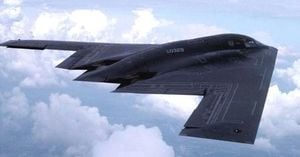Former national security adviser John Bolton has made quite the stir recently, unleashing strong criticism aimed at Kash Patel, President Donald Trump’s nominee for the FBI director position. Bolton drew a dramatic parallel between Patel and Lavrentiy Beria, the infamous leader of the Soviet secret police under Joseph Stalin. This comparison evokes images of past repressions and raises eyebrows at what it might signify for the future of U.S. law enforcement under Trump's administration.
During an appearance on NBC’s "Meet The Press" this past Sunday, Bolton articulated his concerns about Patel's nomination. “Trump has nominated Kash Patel to be his Lavrentiy Beria,” he stated, emphasizing, "Fortunately, the FBI is not the NKVD. The Senate should reject this nomination 100-0.” NKVD, the acronym for the Soviet Union's secret police, was well-known for its covert operations, stringent enforcement of Stalin's policies, and often brutal methods.
John Bolton, who served as national security adviser during the first Trump administration, has portrayed Patel as someone who embodies extremes. He went on to decry the potential elevation of Patel to such a significant position, stoking fears of what could happen if someone labeled as Trump’s loyalist was put at the helm of the FBI. During his tenure as senior director for counterterrorism at the National Security Council, Patel has been known to espouse views aligned with Trump’s more controversial approaches to issues of law and order.
To some, Patel’s credentials might seem unorthodox, and his past statements add fuel to Bolton’s stark warning. He has previously hinted at shutting down the FBI building and converting it to what he describes as "a museum of the deep state." His critique of the FBI has included assertions of its failures to uphold justice, prompting opinions on whether he would aim to radically reform the agency if confirmed.
Historically, Beria’s reputation for employing surveillance and terror tactics to maintain Stalin’s grip on power is haunting and not to be taken lightly. Critics see Bolton's comments as more than mere political theater; they reflect deep-seated fears about the integrity of the FBI should Patel's nomination proceed without serious scrutiny or challenges.
Since Trump put forth Patel’s name for the role, many across political aisles have opted to weigh in. The nomination was meant to enthuse Trump's base, who view Patel not just as loyal but as someone committed to implementing their vision of law enforcement. Over the weekend, Trump praised Patel as “a brilliant lawyer, investigator, and ‘America First’ fighter.” What remains to be seen, though, is how the Senate, traditionally charged with reviewing such nominations, will react to the flood of criticisms.
Berea himself was executed after Stalin's death, highlighting the precarious nature of holding power. The memories invoke what could be seen as the extremities of state control and surveillance, making some wonder whether Patel's rise would echo Beria’s notorious legacy. Bolton's evocative remarks serve to crystallize fears among some officials and experts about potential overreach if loyalists penetrate key government roles.
Many media commentators have picked apart Patel's background and past affiliations with Trump, with opinions ranging from skepticism about his qualifications to outright concern over the ideological alignment he brings to the table. His history suggests he has acted primarily within the confines of Trump’s agenda, fueling debates on his fitness to lead the FBI, which requires impartiality and public trust.
The Senate has often been the gatekeeper for nominees to high office, and Patel’s confirmation will depend largely on bipartisan reactions. With tumultuous political atmospheres and deep polarization, any moment resembling overwhelming rejection is uncertain.
Yet, Bolton isn’t alone; others have raised alarms about Patel's inclinations. Some experts are vocal about the dangers of packing the FBI with Trump loyalists who might prioritize party loyalty over adherence to rule of law. There exists pervasive anxiety around the potential reshaping of the agency's mandate, reminiscent of how figures like Beria redefined their institutions to consolidate power.
The nomination is coupled with heightened sensitivity toward issues surrounding personal allegiance to Trump rather than dedication to the mission of the FBI and, by extension, justice for all. The FBI’s historical commitment to democracy and civil liberties stands on shaky ground when figures with ties to aggressive political movements are nominated.
It remains apparent: Bolton’s harsh critique signals broader discontent with the direction of the upcoming administration, showcasing how Patel's nomination could reshape the discourse around public trust and ethical governance. Amid the remarks harking to controversial eras of Soviet history, serious discussions will need to tackle what this means for the future of crime-fighting and civil rights within the United States.
Looking forward, the impending confirmation hearings promise to be electrifying as both supporters and detractors attempt to establish Patel’s place not just within the FBI, but within the fabric of American society. Each senator's vote will hold significant weight, determining whether Patel will succeed or whether Bolton’s urging might resonate dramatically through legislative halls.
For now, Patel stands at the epicenter of the storm brewing over FBI oversight, and as with many aspects of contemporary American politics, all eyes will be trained on Washington as this narrative develops.



